Experts and D.C. Residents Come Together for Breast Cancer Community Forum
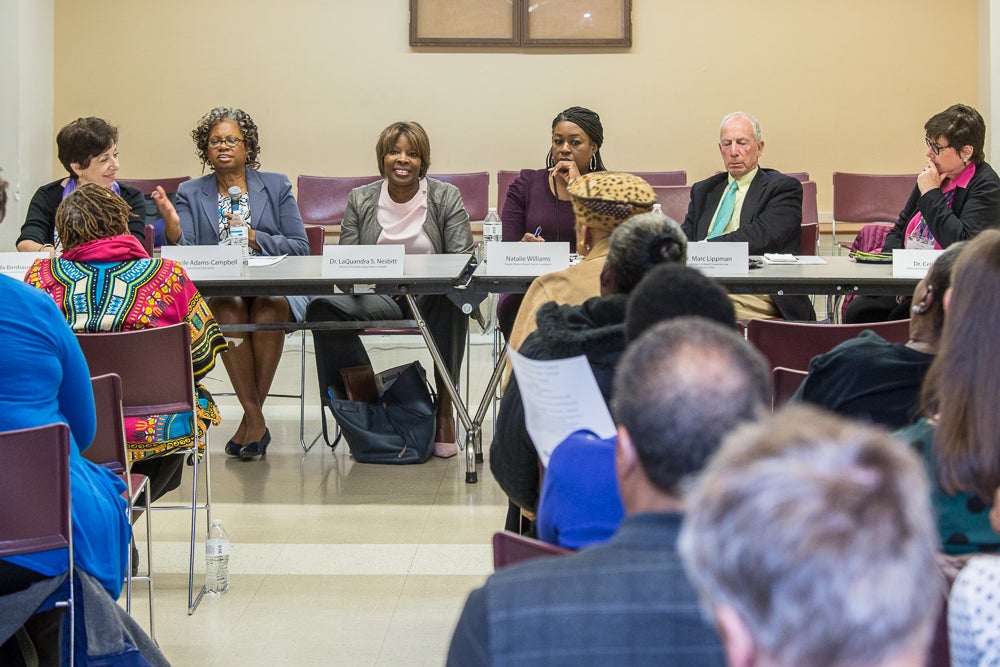
Posted in GUMC Stories | Tagged breast cancer, cancer, community outreach, health disparities, population health
(November 27, 2018) — District of Columbia residents shared their stories, concerns and fears at Environment & Breast Cancer: Transforming Data Into Action, a community forum organized by Georgetown Lombardi Comprehensive Cancer Center to explore the impacts of the environment on breast cancer in communities like Washington’s Wards 7 and 8.
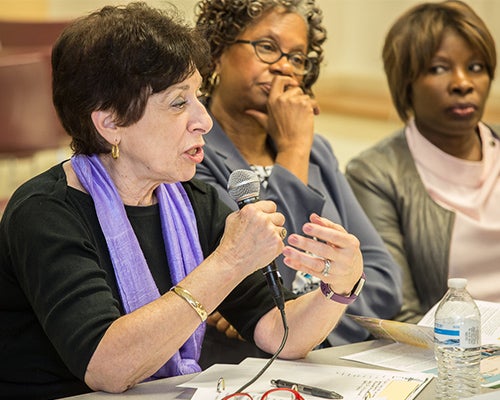
“We can more easily identify what’s in our environment, often, and do something about it, than we can our genes,” said Linda Birnbaum, PhD, director of the National Institute of Environmental Health Sciences (NIEHS) and panelist for the Nov. 8 evening event held at Thurgood Marshall Academy Public Charter High School. The forum was part of the Breast Cancer and the Environment Research Program (BCERP) 13th annual meeting hosted this year by Georgetown Lombardi.
Understanding the Cancer Environment
In the District’s Wards 7 and 8, Superfund sites and ground fills are unpleasant yet obligatory features of the environment, explained cancer epidemiologist Lucile Adams-Campbell, PhD, who leads Georgetown Lombardi’s Office of Minority Health & Health Disparities Research — which announced its new Ward 8 Initiative during the community forum.
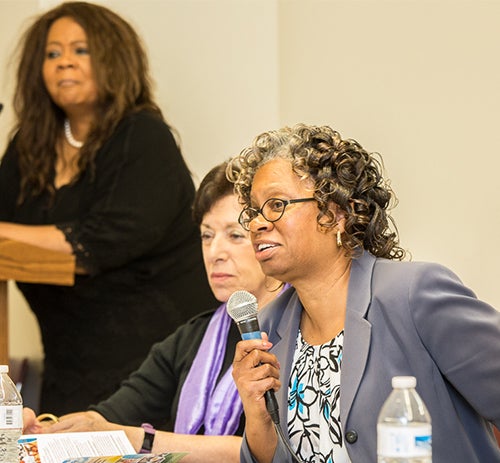
Researchers need to understand what kinds of exposures people are experiencing to better address why incidences of breast cancer are so high in those communities, she said.
In addition to chemical exposures, there’s strong evidence suggesting that the occurrence and recurrence of breast cancer is linked to depression, diabetes, obesity and stress, all of which are pervasive in minority communities, said panelist Marc Lippman, MD, a professor of oncology and breast cancer expert at Georgetown Lombardi.
“How do [external factors like diabetes or depression] talk to cancer [cells]? How does the cancer know you had a bad day?” asked Lippman. “Here’s this little cell sitting around, and it turns out that there are communications, there are things made when you’re depressed, kinds of hormones, if you wish, called cytokines, and they stimulate your cancer.”
Lippman, Adams-Campbell, and MaryBeth Martin, PhD, a professor of oncology at Georgetown Lombardi who serves as a co-principal investigator for BCERP with Celia Byrne, PhD, an epidemiologist at the Uniformed Services University of the Health Sciences, are developing joint projects that will help them understand this process even clearer.
When ZIP Codes Determine Outcomes
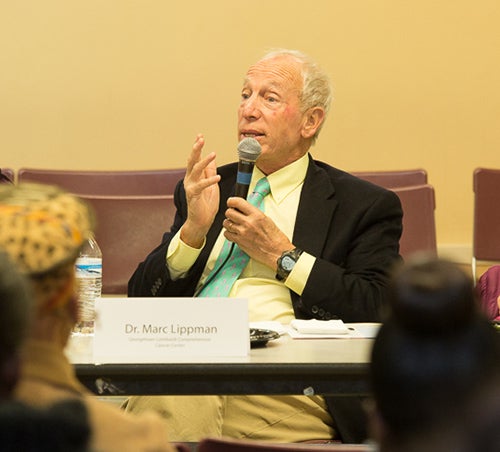
Even though black women consistently get mammograms at higher rates than white women in the District of Columbia, they are three times more likely to die from breast cancer, noted LaQuandra S. Nesbitt, MD, MPH, director of the District of Columbia Department of Health, an indication that environmental factors such as the ones Lippman mentioned do play a role.
Social stressors that some communities of color experience, such as racism and classism, can also contribute to health disparities, she added.
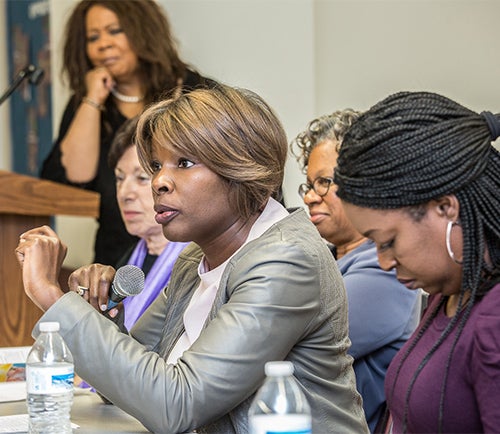
Both Adams-Campbell and Nesbitt acknowledged the disproportionate burden of disease in Wards 7 and 8, and how simply living in a certain ZIP code can lead to different health outcomes. But they discouraged attendees from giving in to anxiety and apprehension.
“There’s a lot that we don’t know about how certain things in the environment, and what is in the environment, is influencing your health and how it will impact your health five, 10, 15 or 20 years from now,” said Adams-Campbell, who as associate director of minority health & health disparities research at Georgetown Lombardi also leads the Capital Breast Care Center (CBCC).
Eliminating Awareness and Compassion Disparities
After the researchers spoke, community members shared personal stories of how breast cancer and other types of cancer have impacted their lives and those of their loved ones.
“We get exposed to things that we’re not even aware of; some we’re aware, some of them not,” said a woman who told the audience she has lived in Ward 8 since 2001. “I feel I’m more at risk for everything living here. I don’t think it’s unfounded. We don’t get the same level of city services as other parts of the city.”
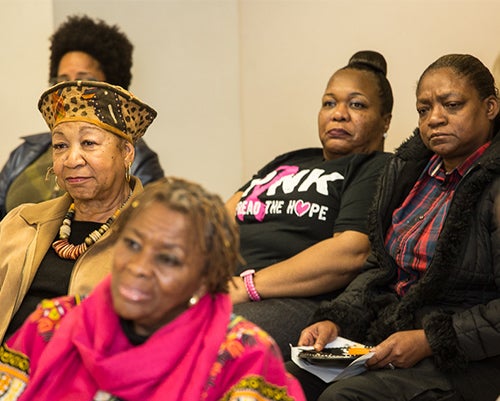
Urging panelists to come into underserved areas with their colleagues more often, another community forum attendee spoke about losing several family members to cancer, including a sister who paid the price of health illiteracy because she lacked access to health experts and information.
“My sister was 38 years old and died of ovarian cancer. She was in fourth stage — didn’t know what was going on. She worked so much. She didn’t have time to go back and forth to the doctor.”
Nesbitt acknowledged that dealing with health challenges, including managing a chronic disease, while trying to navigate an often complicated health system can be tough for anyone — particularly when you have to face implicit bias.
“We are about to embark on a serious journey in this city, where we have got to hold our health care providers, and our community-based organizations, and our social support providers to a higher standard of how they treat people with dignity, respect and compassion,” she said.
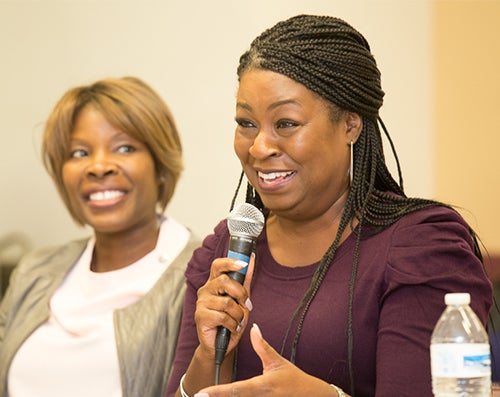
Highlighting the importance of having a community advisory council, Adams-Campbell explained that through focus groups and town hall meetings, she and her team at the CBCC are mindful that the environment is top-of-mind for the communities they serve.
“And we are very much aware of the illiteracy issue,” said Adams-Campbell, adding that she sometimes has to correct students who devise research surveys that are sound from an academic perspective, but are not viable for the lay audiences whose health they are working to advance.
Creating culturally appropriate content involves more than just putting a black woman on the cover of some literature, said Natalie Williams, a breast cancer survivor, health advocate and Ward 8 resident. She recalled being taken aback by the sight of 300 women who showed up at an educational brunch she hosted at Ward 8’s Matthews Memorial Baptist Church in celebration of her last cancer treatment.
Seeing that so many women in her community wanted to learn more about breast cancer inspired her to launch the Natalie Williams Breast Care Foundation to increase breast cancer awareness among women of color.
“The more we communicated with the community, the more we realized people wanted more information,” she said.
Seren Snow
GUMC Communications
